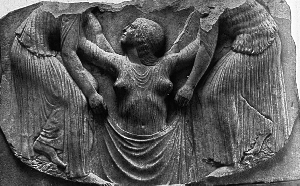Before Plato
Ludovisi throne: The birth of Aphrodite (460 BC) 
-
Heraclitus (500 BC)
The emotional state is characterized by a mixture of body parameters such
as temperature (hot/cold) and sweat amount (wet/dry). A normal state (non
emotional?) would be dry and cold.
-
Anaxagoras (500 BC)
Plants as well as animals experience pleasure. All sensations (sensory
perception) are accompanied by (unconscious) pain. Pain is felt (become
conscious) only when it is intense enough, or in excess.
-
Empodocles (490 BC)
Men think and feel with their body (blood around the heart region).
-
Diogenes of Apollonia (460 BC)
Pleasure and Pain result from blood aeration, mediated by the toungue.
-
Democritus (460 BC)
Happiness (positive emotion) is characterized by a state of mental and
physical equilibrium. Thoughts (cognitions) are the result of a distributed
interaction of some localized corporeal components.
For Example:
-
Rationality: in the chest
-
Control of behavior: in the head
-
Resentment: in the heart
-
Appetite: in the Liver
-
Hippocrates (460 BC)
- The brain is at least partly responsible for conscious life (emotions
included). The emotional states are characterized by brain temperature,
moisture and aridity.
-
Fear arises from brain overheating. Ex flushed face, red eyes. It is due
to the flow of bile. Melancholy is a state of persistent fear, i.e continuous
flow of bile.
-
Grief and anxiety arise from brain cooling. It is due to the flow of phlegm.
In normal states, corporeal elements are mixed in a balanced manner. Pain
results if one or several elements are disfunctional. This is considered
as the first biological theory of pain.
- The ease of circulation, and amount of pneuma (air, within the body)
is besides the brain, a second source of emotional control, through its
influence on blood supply, and intimate relation with blood itself. Emotional
expressions (symptoms) are mediated by organs such as;
-
Diaphragm: active in unexpected joy or grief.
-
Heart: contracts in surprise and strong passions, dilates in good humor.
-
Lungs: in outbursts of anger.
-
Socrates (470 BC)
Adds moral life (higher cognitive/divine functions) to physical and medical
characterization of emotion. Happiness is made of pleasure, utility and
good. His disciples formally associated pleasure with good, and pain with
evil. They introduced the concept of ideal pleasures (pleasure in a prospering
buisiness).
For More Information
-
Hippocrates:
- The Regimen on
line: a theory of 'temperaments'.(M.I.T.)
- The Sacred Disease
on line: pain. (M.I.T).
Editor: Jean-Marc Fellous
